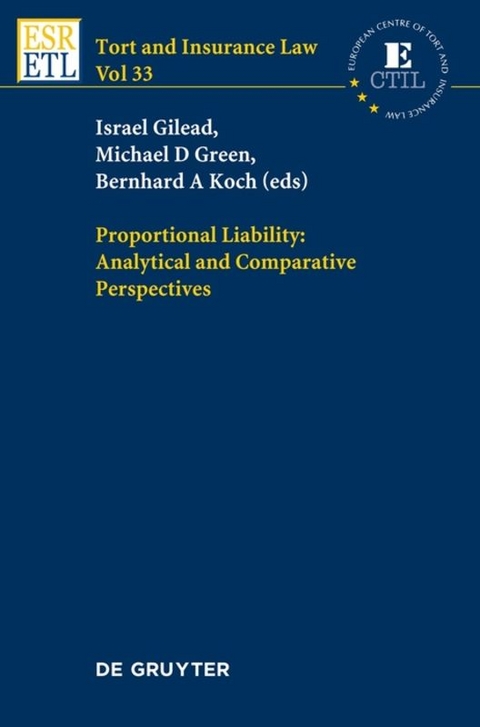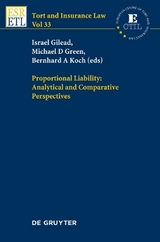Proportional Liability: Analytical and Comparative Perspectives
Seiten
2013
De Gruyter (Verlag)
978-3-11-028253-5 (ISBN)
De Gruyter (Verlag)
978-3-11-028253-5 (ISBN)
Liability law is rapidly changing in quite a number of countries. This is due to various factors, which are interrelated to a large extent: changing case law and legislation as well as increased and still increasing technical and medical knowledge. As a result, various occupational diseases can, for example, be attributed to working conditions or personal injury to specific products. From the very moment that causation can be proven, the question arises of whether or not liability can be established‑ with far-reaching economic consequences for all parties involved. The rise of phenomena such as mass torts, multiple causation, joint and several liability or various heads of damages (like ecological damage and several diseases and affections) rapidly increases the interest in tort law. In the context of the interrelation between liability and insurance, attention must be paid to the question of whether certain liabilities are still coverable or not, and, if they are, to what amounts. (The question of jurisdictions is of growing importance as is the question of whether a specific liability can be covered by insurance. In this context, one should bear in mind that the affordability of tort law also requires safe and sound insurers. The recent past has shown that there is a limit to their financial stability.)
Causal uncertainty is a wide-spread phenomenon. Courts are often unable to determine whether a defendant’s tortious conduct was a factual cause of a plaintiff’s harm. Yet, sometimes courts can determine the probability that the defendant caused the plaintiff’s harm, although often there is considerable variance in the probability estimate based on the available evidence. The conventional way to cope with this uncertainty has been to apply the evidentiary rule of ‘standard of proof’. The application of this ‘all or nothing’ rule can lead to unfairness by absolving defendants who acted tortiously and may also create undesirable incentives that result in greater wrongful conduct and injustice to victims. Some courts have decided that this ‘no-liability’ outcome is undesirable. They have adopted rules of proportional liability that compensate plaintiffs according to the probability that their harm was caused by the defendant’s tortious conduct. In 2005 the Principles of European Tort Law (PETL) made a breakthrough in this regard by embracing rules of proportional liability. This project, building on PETL, endeavours to make further inquiries into the desirable scope of proportional liability and to offer a more detailed view of its meaning, implications, and ramifications.
Causal uncertainty is a wide-spread phenomenon. Courts are often unable to determine whether a defendant’s tortious conduct was a factual cause of a plaintiff’s harm. Yet, sometimes courts can determine the probability that the defendant caused the plaintiff’s harm, although often there is considerable variance in the probability estimate based on the available evidence. The conventional way to cope with this uncertainty has been to apply the evidentiary rule of ‘standard of proof’. The application of this ‘all or nothing’ rule can lead to unfairness by absolving defendants who acted tortiously and may also create undesirable incentives that result in greater wrongful conduct and injustice to victims. Some courts have decided that this ‘no-liability’ outcome is undesirable. They have adopted rules of proportional liability that compensate plaintiffs according to the probability that their harm was caused by the defendant’s tortious conduct. In 2005 the Principles of European Tort Law (PETL) made a breakthrough in this regard by embracing rules of proportional liability. This project, building on PETL, endeavours to make further inquiries into the desirable scope of proportional liability and to offer a more detailed view of its meaning, implications, and ramifications.
Israel Gilead, Hebrew University of Jerusalem, Israel; Michael D. Green, Wake Forest University School of Law, Winston-Salem, USA; Bernhard A. Koch, Innsbruck University, Austria.
| Erscheint lt. Verlag | 17.9.2013 |
|---|---|
| Reihe/Serie | Tort and Insurance Law ; 33 |
| Verlagsort | Berlin/Boston |
| Sprache | englisch |
| Maße | 155 x 230 mm |
| Gewicht | 763 g |
| Themenwelt | Recht / Steuern ► Allgemeines / Lexika |
| Recht / Steuern ► EU / Internationales Recht | |
| Recht / Steuern ► Privatrecht / Bürgerliches Recht ► Besonderes Schuldrecht | |
| Recht / Steuern ► Privatrecht / Bürgerliches Recht ► Internationales Privatrecht | |
| Schlagworte | Birke • Comparative • comparative law • Foreign Law • Haftung • Internationales Recht, Ausländisches Recht • International Law • International Law, Foreign Law, Comparative Law • International Law, Foreign Law, Comparative Law, other • Law • Liability • liability law • Liability (Law) • LL59 • Other • Reader • Schadenersatzrecht • Schadensersatzrecht • Schadensersatzrecht (SchadensersatzR) • Tort law • torts • Unerlaubte Handlung • Writing |
| ISBN-10 | 3-11-028253-4 / 3110282534 |
| ISBN-13 | 978-3-11-028253-5 / 9783110282535 |
| Zustand | Neuware |
| Haben Sie eine Frage zum Produkt? |
Mehr entdecken
aus dem Bereich
aus dem Bereich
steueroptimiert übertragen und den Schenker absichern
Buch | Softcover (2023)
C.H.Beck (Verlag)
14,90 €
Vertragliche Schuldverhältnisse
Buch | Softcover (2022)
C.F. Müller (Verlag)
26,00 €
Bürgerliches Gesetzbuch, EuErbVO, ZPO, FamFG, BeurkG, HöfeO, ErbStG, …
Buch | Softcover (2023)
dtv Verlagsgesellschaft
25,90 €




